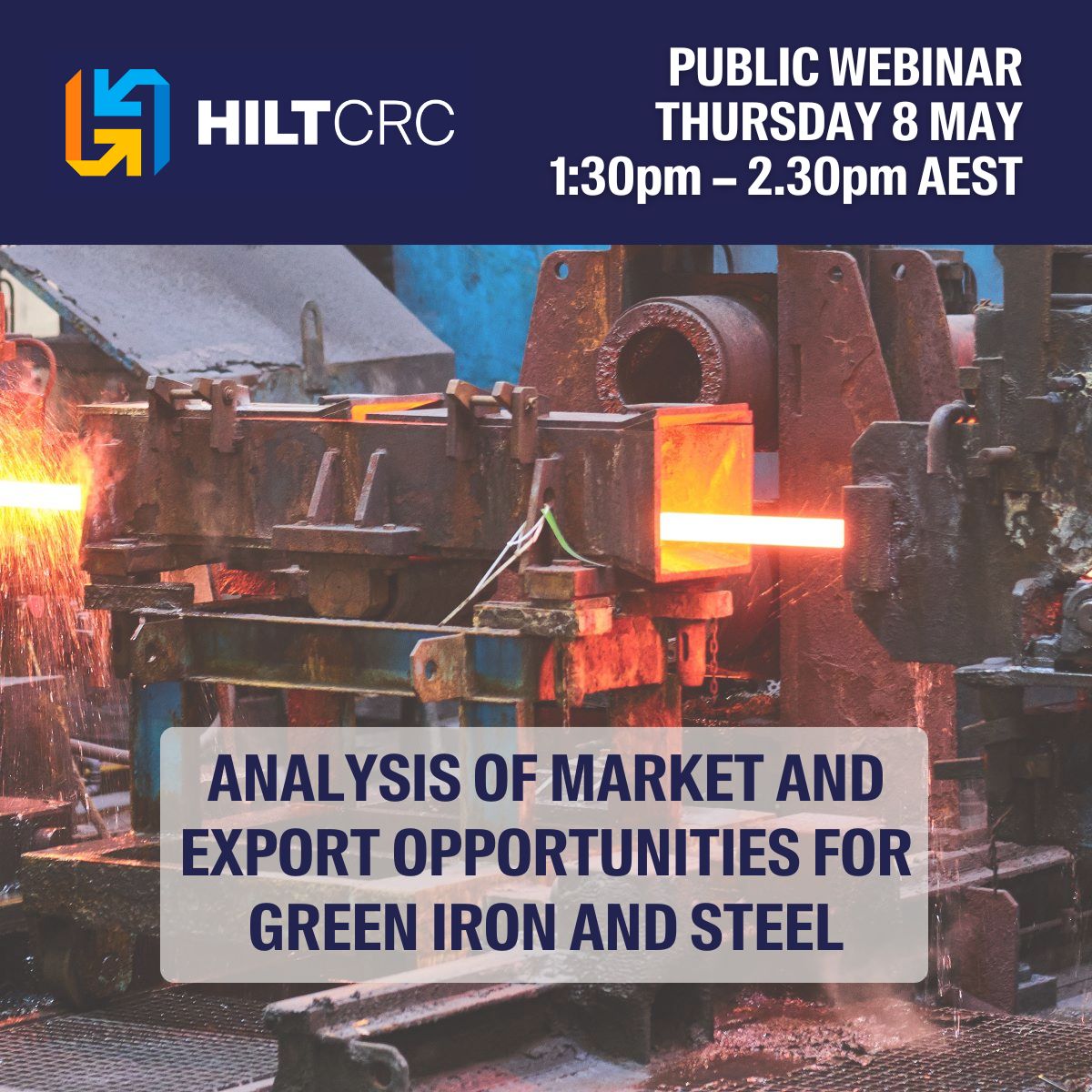HILT CRC public webinar
Webinar | 08 May 2025 | 13:30–14:30 AEST | 05:30-06:30 CEST

Join us for an insightful exploration of Australia’s unique position in the evolving green iron and steel landscape. This webinar will present findings from two complementary HILT CRC projects that examine the economic, market and geographical factors shaping Australia’s potential transition from traditional iron ore exporter to green iron and steel innovator.
RP3.004 Intermediate product exports for Australia-China green steel focuses on our biggest trading partner and the world’s largest steel producer. It examines the potential for Australia to export not just raw ore or finished steel to China, but intermediate processed products that could reduce emissions and create new export pathways.
RP3.005 Market, cost and locational factors for green iron and steel in Australia investigates market size, cost competitiveness, carbon pricing impacts and preferred locations for green iron and steel production within Australia. It will provide a clearer picture of how Australia stacks up globally and the conditions needed to build a viable domestic industry.
Agenda
- Welcome – Jenny Selway, CEO, HILT CRC
- Introduction – A/Prof. Fiona Beck, The Australian National University (ANU) and Research Lead of HILT CRC’s Facilitating Transformation Program
- RP3.004 – Dr Jorrit Gosens, Fellow, Centre for Climate and Energy Policy, ANU
- RP3.005 – Prof. Frank Jotzo, Director, Centre for Climate and Energy Policy, ANU
- Q&A session
Speakers
Associate Professor Fiona Beck, The Australian National University

Fiona Beck is an Associate Professor at the Australian National University’s School of Engineering. She has over 15 years’ experience developing novel technologies for renewable energy, including solar cells and the photoelectrochemical production of renewable fuels and commodities based on hydrogen and hydrocarbons.
Over the past 5 years, Fiona’s work has combined engineering, energy policy, and techno-economics to provide high quality information on the costs, benefits, and implications of decarbonisation pathways for a range of industry and government stakeholders. As such, she has contributed significantly to the national conversation on new, zero-carbon industries and exports, through academic publications, presentations to stakeholders, submissions to government, and contributions in the media.
Professor Frank Jotzo, Director, Centre for Climate and Energy Policy, The Australian National University

Frank Jotzo is Professor of environmental and climate change economics at the ANU Crawford School of Public Policy, director of the Centre for Climate and Energy Policy, and Head of Energy at the ANU Institute for Climate, Energy and Disaster Solutions.
Frank has advised national and state governments in Australia in formal and informal roles, as well as international organisations and businesses. In 2023-24 he led the Australian government’s Carbon Leakage Review. He has held lead author roles with the Intergovernmental Panel on Climate Change, was joint editor-in-chief of the journal Climate Policy, and has led or co-led various policy relevant research initiatives and projects.
Frank’s research and research leadership spans a wide range of aspects of climate change economics and energy transition policy. Topics include policy instruments for climate change and environment, decarbonisation and net-zero strategies, economics of energy transition, trade and investment, and political economy and international dimensions of climate and energy policy.
Frank teaches the ANU Masters course Domestic Climate Change Policy and Economics contributes to courses including International Climate Change Policy and Economics, teaches executive education short courses, and supervises PhD scholars on topics that directly relate to his research.
Dr Jorrit Gosens, Fellow, Centre for Climate and Energy Policy, The Australian National University

Jorrit Gosens received his PhD in Environmental Economics & Management from the Research Center for Eco-Environmental Sciences, Chinese Academy of Sciences, for a thesis focused on the formation of China’s capabilities, and the transition from lagging to leading, in renewable energy industries.
During his post-doc period, Jorrit’s work was similarly focused on geographical elements of innovation in renewable energy industries, aiming to understand how different countries’ innovation systems are inter-linked, why industries tend to relocate over time, and how strongly domestic technological developments are influenced by what happens at the global level, and vice versa.
In his current position at the Crawford School Jorrit builds models of energy and resource markets, with a particular focus on Australia-China trade in thermal and coking coal, iron ore, and how these will be affected by plans for decarbonisation including the switch to green steel.
Jorrit has been researching Chinese energy policy and Chinese renewable energy industry formation for over a decade, directs the Strategic Research Spoke ‘Energy Transitions’ at the Australian Centre on China in the World, and is creator and editor of China Energy Portal, a website that provides translations of Chinese energy policy and statistics.

